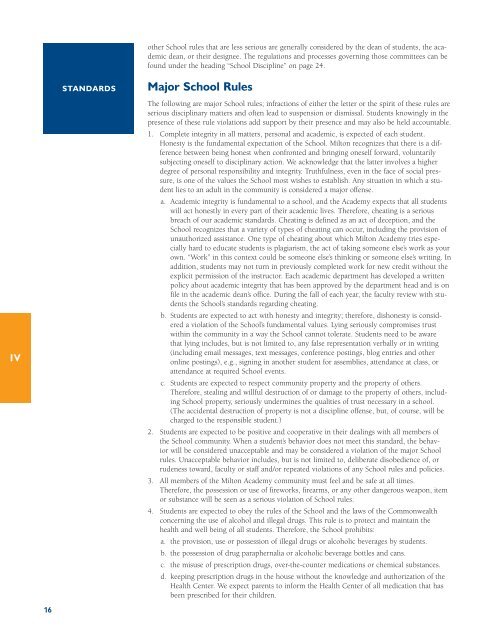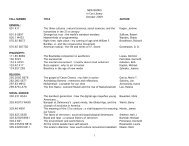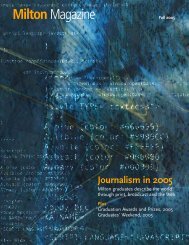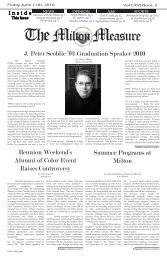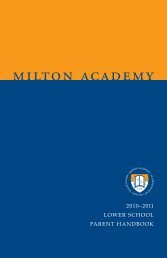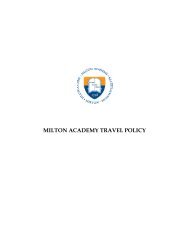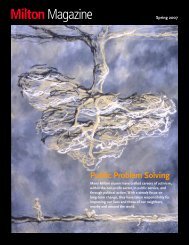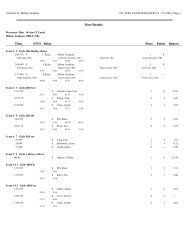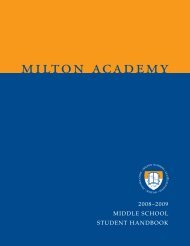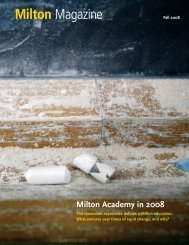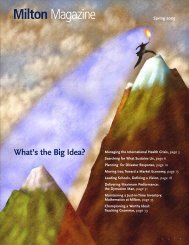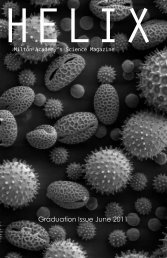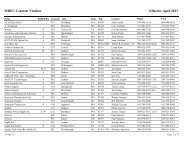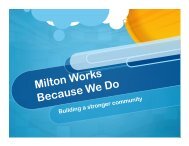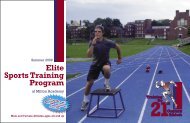Upper School Student Handbook 2013–2014 - Milton Academy
Upper School Student Handbook 2013–2014 - Milton Academy
Upper School Student Handbook 2013–2014 - Milton Academy
You also want an ePaper? Increase the reach of your titles
YUMPU automatically turns print PDFs into web optimized ePapers that Google loves.
other <strong>School</strong> rules that are less serious are generally considered by the dean of students, the academic<br />
dean, or their designee. The regulations and processes governing those committees can be<br />
found under the heading “<strong>School</strong> Discipline” on page 24.<br />
standards<br />
Major <strong>School</strong> Rules<br />
IV<br />
The following are major <strong>School</strong> rules; infractions of either the letter or the spirit of these rules are<br />
serious disciplinary matters and often lead to suspension or dismissal. <strong>Student</strong>s knowingly in the<br />
presence of these rule violations add support by their presence and may also be held accountable.<br />
1. Complete integrity in all matters, personal and academic, is expected of each student.<br />
Honesty is the fundamental expectation of the <strong>School</strong>. <strong>Milton</strong> recognizes that there is a difference<br />
between being honest when confronted and bringing oneself forward, voluntarily<br />
subjecting oneself to disciplinary action. We acknowledge that the latter involves a higher<br />
degree of personal responsibility and integrity. Truthfulness, even in the face of social pressure,<br />
is one of the values the <strong>School</strong> most wishes to establish. Any situation in which a student<br />
lies to an adult in the community is considered a major offense.<br />
a. Academic integrity is fundamental to a school, and the <strong>Academy</strong> expects that all students<br />
will act honestly in every part of their academic lives. Therefore, cheating is a serious<br />
breach of our academic standards. Cheating is defined as an act of deception, and the<br />
<strong>School</strong> recognizes that a variety of types of cheating can occur, including the provision of<br />
unauthorized assistance. One type of cheating about which <strong>Milton</strong> <strong>Academy</strong> tries especially<br />
hard to educate students is plagiarism, the act of taking someone else’s work as your<br />
own. “Work” in this context could be someone else’s thinking or someone else’s writing. In<br />
addition, students may not turn in previously completed work for new credit without the<br />
explicit permission of the instructor. Each academic department has developed a written<br />
policy about academic integrity that has been approved by the department head and is on<br />
file in the academic dean’s office. During the fall of each year, the faculty review with students<br />
the <strong>School</strong>’s standards regarding cheating.<br />
b. <strong>Student</strong>s are expected to act with honesty and integrity; therefore, dishonesty is considered<br />
a violation of the <strong>School</strong>’s fundamental values. Lying seriously compromises trust<br />
within the community in a way the <strong>School</strong> cannot tolerate. <strong>Student</strong>s need to be aware<br />
that lying includes, but is not limited to, any false representation verbally or in writing<br />
(including email messages, text messages, conference postings, blog entries and other<br />
online postings), e.g., signing in another student for assemblies, attendance at class, or<br />
attendance at required <strong>School</strong> events.<br />
c. <strong>Student</strong>s are expected to respect community property and the property of others.<br />
Therefore, stealing and willful destruction of or damage to the property of others, including<br />
<strong>School</strong> property, seriously undermines the qualities of trust necessary in a school.<br />
(The accidental destruction of property is not a discipline offense, but, of course, will be<br />
charged to the responsible student.)<br />
2. <strong>Student</strong>s are expected to be positive and cooperative in their dealings with all members of<br />
the <strong>School</strong> community. When a student’s behavior does not meet this standard, the behavior<br />
will be considered unacceptable and may be considered a violation of the major <strong>School</strong><br />
rules. Unacceptable behavior includes, but is not limited to, deliberate disobedience of, or<br />
rudeness toward, faculty or staff and/or repeated violations of any <strong>School</strong> rules and policies.<br />
3. All members of the <strong>Milton</strong> <strong>Academy</strong> community must feel and be safe at all times.<br />
Therefore, the possession or use of fireworks, firearms, or any other dangerous weapon, item<br />
or substance will be seen as a serious violation of <strong>School</strong> rules.<br />
4. <strong>Student</strong>s are expected to obey the rules of the <strong>School</strong> and the laws of the Commonwealth<br />
concerning the use of alcohol and illegal drugs. This rule is to protect and maintain the<br />
health and well being of all students. Therefore, the <strong>School</strong> prohibits:<br />
a. the provision, use or possession of illegal drugs or alcoholic beverages by students.<br />
b. the possession of drug paraphernalia or alcoholic beverage bottles and cans.<br />
c. the misuse of prescription drugs, over-the-counter medications or chemical substances.<br />
d. keeping prescription drugs in the house without the knowledge and authorization of the<br />
Health Center. We expect parents to inform the Health Center of all medication that has<br />
been prescribed for their children.<br />
16


